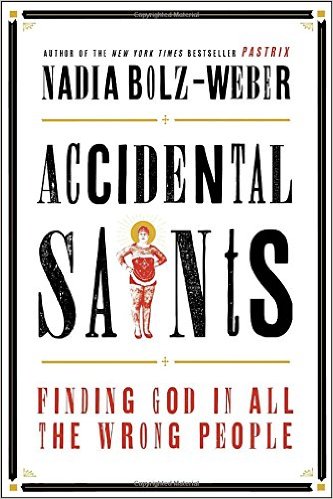
If Robert Farrar Capon and Joan Jett had a love child, I’m pretty sure she’d be something like Nadia Bolz-Weber. If you somehow haven’t heard of NBW yet, she’s the founding pastor of an Evangelical Lutheran Church called the House For All Saints and Sinners in Denver, Colorado. And she is bringing an entirely new voice to the theological landscape of America. I for one am all for it.
I was lucky enough to get my hands on an advance copy of her latest book, Accidental Saints: Finding God in All the Wrong People (out today!). Her first one, the New York Times bestselling Pastrix, was fantastic. Accidental Saints is just as good, if not better.
 Nadia takes the reader through the intimacies of parish ministry, sharing story after beautiful/painful story about the weirdness that is running a church. I’m not going to give any of them away in this review. But don’t let the tattoos throw you off. If you work on a church staff of any denominational variety, this is a must read.
Nadia takes the reader through the intimacies of parish ministry, sharing story after beautiful/painful story about the weirdness that is running a church. I’m not going to give any of them away in this review. But don’t let the tattoos throw you off. If you work on a church staff of any denominational variety, this is a must read.
Yet my love of Accidental Saints comes from a more personal place than just church ministry. As much as I dig my Luther, Zahl, and Forde, I have longed for a female voice to talk about grace with no strings attached. I needed that voice to be grounded in scripture without apologies, not to shy away from Christ or his cross. I needed it to be strong and articulate. And, unbeknownst to me, I needed some honest, salty language thrown in.
Of course, NBW’s message is one that addresses all of us: we live as sinners forgiven by a merciful God.
Perhaps the best way to get a sense of what makes the book so special is to share a few of my favorite theological vignettes. It’s chock full of them, though, so probably better to get your own copy. But here are a few:
My spirituality is most active in the moments when I realize God may have gotten something beautiful done through me despite the fact that I am an asshole, and when I am confronted by the mercy of the gospel so much that I cannot hate my enemies, and when I am unable to judge the sin of someone else (which, let’s be honest, I love to do), because my own crap is too much in the way, and when I have to bear witness to another human being’s suffering despite my desire to be left alone, and when I am forgiven by someone even though I don’t deserve it and my forgiver does this because he too, is trapped by the gospel…and when I end up being changed by learning to love someone I’d never choose out of a catalog but whom God sends my way to teach me about God’s love. But none of these things are a result of spiritual practices or disciplines, as admirable as those things can be. They are born in a religious life, in a life bound by ritual and community, by repetition, by work, by giving, by receiving, by mandated grace.
On how being a pastor is about leading people into sure death (and resurrection):
Photo courtesy of Hawley Schneider Photography. (www.hawleyschneider.com)
So often in the church, being a pastor or a “spiritual leader” means being the example of “godly living.” A pastor is supposed to be the person who is really good at this Christianity stuff—the person others can look to as an example of righteousness. But as much as being the person who is the best Christian, who “follows Jesus” the most closely can feel a little seductive, it’s simply never been who I am or who my parishioners need me to be. I’m not running after Jesus. Jesus is running my ass down. Yeah, I am a leader, but I’m leading them onto the street to get hit by the speeding bus of confession and absolution, sins and sainthood, death and resurrection—that is, the gospel of Jesus Christ. I’m a leader, but only by saying, “Oh, screw it. I’ll go first.”
On the pain of grace:
The sting of grace is not unlike the sting of being loved well, because when we are loved well, it is inextricably linked to all the times we have not been loved well, all the times we ourselves have not loved others well, and all the things we’ve done or not done that feel like evidence against our worthiness. Love and grace are such deceivingly soft words—but they both sting like hell and then go and change the shape of our hearts and make us into something we couldn’t create ourselves to be.
The most remarkable thing about Nadia, though, isn’t that she is a woman speaking in a theological field of men. Or that she’s incredibly funny and wise. What makes her so different from the many voices out there is her uncontrived vulnerability. She is not simply writing about sin in an abstract sense, she actually risks something of herself on the page. Which means that the grace we read about in Accidental Saints isn’t some sort of disembodied proposition or sentimental nicety, it is Jesus Christ working in and on Nadia, reminding her that she is redeemed, despite herself.
In other words, Accidental Saints is something very special and all-too-rare: the work of a vulnerable theologian, pastor, and preacher of the cross, someone not just willing to talk about God’s grace and forgiveness, but to dive in headlong saying “Oh, screw it. I’ll go first.”

COMMENTS
4 responses to “A Review of Nadia Bolz-Weber’s Accidental Saints: Finding God in All the Wrong People”
Leave a Reply














Thank you Sarah, I heard Nadia share part of this book in January, and told myself I might want to get that book when it comes out. . . It is good to e reminded now that it is now available.
Two interesting points. . .
1. The female voice. That is interesting to me. I will often state that there is something marvelous about having different lectors each week in worship. There is an embodiment of the word there. And this is also true when engaging a theologian. Nice.
2. “I needed some honest, salty language thrown in.” – As someone who might also use such language – in a watered down form from Pastor Bolz-Weber, maybe – I do think that, at times, a little of that goes a long way. . .
Finally – my reason for writing – As someone who serves in the same tradition as Nadia, I am proud of her. I am glad for her clear articulation of the Gospel of grace.
It is my sense that Nadia would not see herself as one who “is bringing an entirely new voice to the theological landscape of America.”
Rather, she seems to me to be speaking from the “thin tradition” to use Douglas John Hall’s term for the Theology of the Cross.
Just watched the video link here, and it really does touch on one of the deep water points of our life through the Gospel, so very keen to read the book (which is now on my wish list).